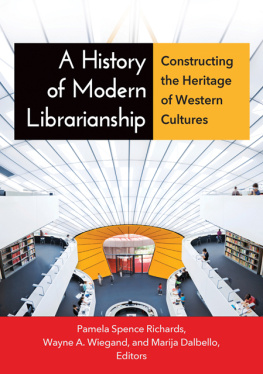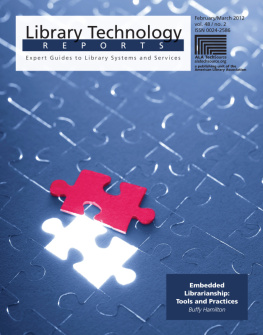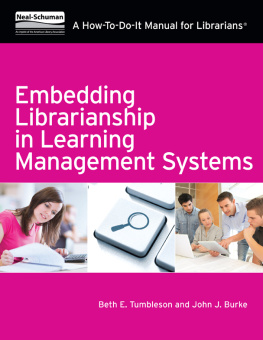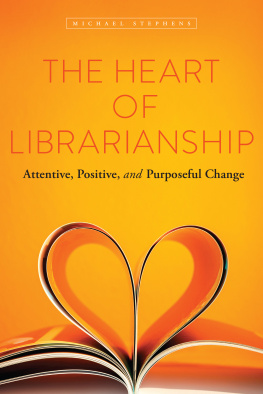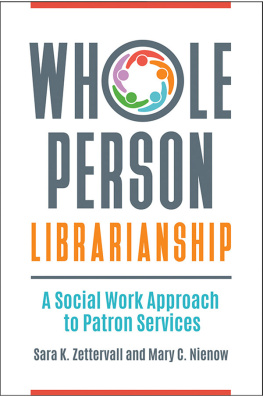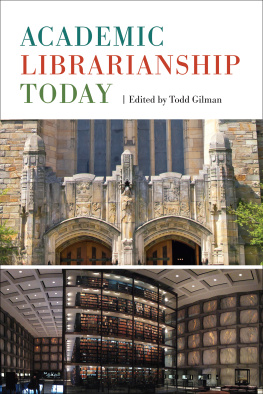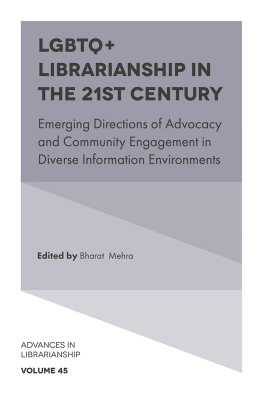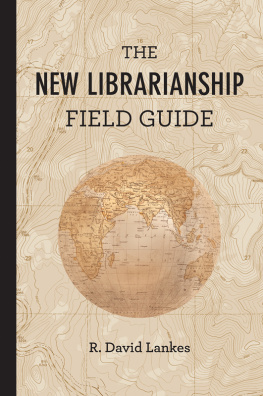

Copyright 2015 by Pamela Spence Richards, Wayne A. Wiegand, and Marija Dalbello
All rights reserved. No part of this publication may be reproduced, stored in a retrieval system, or transmitted, in any form or by any means, electronic, mechanical, photocopying, recording, or otherwise, except for the inclusion of brief quotations in a review, without prior permission in writing from the publisher.
Library of Congress Cataloging-in-Publication Data
A history of modern librarianship : constructing the heritage of western cultures / Pamela Spence Richards, Wayne A. Wiegand, and Marija Dalbello, editors.
pages cm
ISBN 978-1-61069-099-7 (paperback) ISBN 978-1-4408-3473-8 (ebook)
1. Library scienceHistory. 2. Libraries and societyHistory. I. Richards, Pamela Spence, 1941 editor. II. Wiegand, Wayne A., 1946 editor. III. Dalbello, Marija, editor.
Z665.H576 2015
020.9dc23 2015002077
ISBN: 978-1-61069-099-7
EISBN: 978-1-4408-3473-8
19 18 17 16 15 1 2 3 4 5
This book is also available on the World Wide Web as an eBook.
Visit www.abc-clio.com for details.
Libraries Unlimited
An Imprint of ABC-CLIO, LLC
ABC-CLIO, LLC
130 Cremona Drive, P.O. Box 1911
Santa Barbara, California 93116-1911
This book is printed on acid-free paper 
Manufactured in the United States of America
In Memory of Pamela Spence Richards, 19411999
Contents
Wayne A. Wiegand and Marija Dalbello
Peter Hoare
Wayne A. Wiegand
Anthony Olden
Ross Harvey
Marija Dalbello
Preface
A History of Modern Librarianship: Constructing the Heritage of Western Cultures has been a long time coming. In 1992 Pamela Spence Richards (at the time at Rutgers University) and Wayne Wiegand (at the time on the University of WisconsinMadison faculty) sat down in Pams New York apartment to craft a project to consist of essays by library history scholars that would cover seven regions of modern world library history. Wayne agreed to write the essay on the United States and Canada. Pam volunteered to become the sole editor of the essays. In the year following she commissioned authors for the essays, during which time Wayne drafted his essay as a model others could follow. In 1994, however, Pam contracted brain cancer. Although she vowed to carry on with the project during her recuperation (Wayne had finished the first draft of his essay in 1996), her condition worsened, and she died in 1999. Her husband Wim Smits (a historian at Columbia University) told Wayne he would take the project on as a memorial to her, but unfortunately Wim died soon after Pam. For the next few years the project languished.
In 2007 Wayne decided to resurrect Pams project. To help him he asked Marija Dalbello to become co-editor; Marija had been very active in international librarianship andlike Pamwas on the Rutgers faculty. Together, we agreed to keep Pams name as first editor and to donate all royalties the book generated to a scholarship established in Pams honor at Rutgers.
When we contacted authors Pam had originally commissioned in the 1990s, however, we discovered one had passed away and those still living thought the project had died with Pam. When informed the project was once again active, most said they could no longer meet the requirements outlined in project guidelines Pam had written. For Wayne and Marija, it was back to the drawing board if we wanted to save even part of the project. Because Peter Hoare(originally commissioned by Pam in the 1990s to write the essay on Europe) and Tony Olden (who joined the project in 2004 to do the essay on Africa) graciously agreed to complete their work, we decided to reconceptualize the project to focus primarily on librarianships Western traditions through the end of the twentieth century in Europe (Peter), the United States and Canada (Wayne), those parts of Africa colonized in the nineteenth century by Western powers (Tony), and Australia and New Zealand, and add to it an essay on the early twenty-first-century innovations and the intellectual techniques and information technologies leading to this development. When Ross Harvey graciously accepted our invitation to do the essay on Australia and New Zealand and Marija offered to write the concluding essay on digital convergence, we had the makings of the book you now have in your hand.
The editors want to thank Peter and Tony for honoring a commitment to the project they made years earlier and working through several revisions, and to Ross for coming to our aid at such a late date. On behalf of all the authors, we also want to thank the librarians and libraries across the Western world that enabled and facilitated all of these essays (many actually made the library history we discuss), and the institutions employing all of us for making careers in librarianship (whether in teaching or practice) so fun and rewarding. We hope some of those characteristics are evident in our individual essays. Finally, we want to thank Barbara Ittner, our Libraries Unlimited editor, who showed exceptional patience as coeditors and essay authors laboriously worked through numerous (and sometimes painful) revisions, and once the manuscript arrived provided invaluable comments that substantially tightened the books scope. Naturally, we dedicate this book to Pams memory. We hope it stands as testimony to her dedication to an international library history that informs contemporary practice and carries out her vision for A History of Modern Librarianship: Constructing the Heritage of Western Cultures.
Introduction
The historical study of libraries as collections of books and the buildings that house them and the study of books themselvesincluding their preservation and destructionare a common focus of library histories. In our collection, we take a different approach as we present cross-national dimensions of librarianship in the context of modernity. The five essays in this volume are aimed at a general informed reader and specialists in library and information studies. The essays in this book present a history of Western librarianship primarily since the eighteenth century. They contextualize modern developments of the library institution, professionalization of librarianship, the library systems, and technological innovations that shaped the practice and the philosophy of librarianship. Each essay is organized around critical points related to the practice and theory of modern librarianship, following an organization common with conventional histories of this type, which include Michael Harriss classic, History of Libraries in the Western World, published in 1993. Harriss history is an authoritative work, acknowledged as definitive in its coverage of the history of writing, libraries, and librarianship, especially in the ancient world. Our book extends his work by deepening the history of the entire twentieth century and the shaping of modern librarianship, including coverage of the English-speaking colonial world (in its Africa and AustraliaNew Zealand chapters), the postCold War Western world since the 1990s, and a history of librarianships digital convergences of the twentieth and the twenty-first centuries. Our intended audience is interdisciplinary and international, including students and educators in information science and library programs across the Western world, but also historians of print and practicing professionals in all types of libraries who are interested in the history of one of the worlds most important cultural institutions.
Next page
